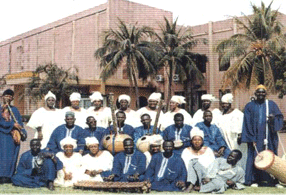|
Kandia Kouyaté
Kandia Kouyaté (also known as Kandja Kouyaté, born in 1959 in Kita, Mali) is a Malian ''jelimuso'' (a female griot) and kora player; she has earned the prestigious title of ''ngara'', and is sometimes called ''La dangereuse'' and ''La grande vedette malienne''. Kouyaté's dense, emotional, hypnotic manner of singing and her lyrical talents have earned huge acclaim in Mali, though she remained relatively little known outside Africa, due to extremely limited availability of her recordings. Her home town of Kita is known for love songs, which form a large part of Kouyaté's repertoire. She also sings praise songs. Kouyaté's career began in the early 1980s, when she started using female choral vocals accompanying her. This practice was later picked up by stars like Mory Kante and Salif Keita Salif Keïta () (born 25 August 1949) is a Malian singer-songwriter, referred to as the "Golden Voice of Africa". He is a member of the Keita royal family of Mali. Biography Early life ... [...More Info...] [...Related Items...] OR: [Wikipedia] [Google] [Baidu] |
Kita, Mali
Kita is a town and urban commune in western Mali. The town is the capital of the Kita Cercle in the Kayes Region. It lies on the eastern slope of Mount Kita (Bambara: "Kita-kulu"), known for its caves and rock paintings. Today, the town is known for its music, its annual Roman Catholic pilgrimage and its role as a processing center for the surrounding cotton- and peanut-growing region. Kita lies on the Dakar-Niger Railway and is the largest transit hub between Bamako (112 miles) and Kayes (205 miles). In the 2018 census the urban commune had a population of 463,787. In November 1955, Kita became a commune of average exercise. On March 2, 1966, Kita became a commune of full exercise. The town grew in the 1990s around the cotton industry, but this has since declined. A fictionalized version of Kita features as the setting for Malian author Massa Makan Diabaté's "Kouta Trilogy" ( Le lieutenant de Kouta, Le coiffeur de Kouta, and Le boucher de Kouta). History Name Kita pr ... [...More Info...] [...Related Items...] OR: [Wikipedia] [Google] [Baidu] |
Mali
Mali (; ), officially the Republic of Mali,, , ff, 𞤈𞤫𞤲𞥆𞤣𞤢𞥄𞤲𞤣𞤭 𞤃𞤢𞥄𞤤𞤭, Renndaandi Maali, italics=no, ar, جمهورية مالي, Jumhūriyyāt Mālī is a landlocked country in West Africa. Mali is the eighth-largest country in Africa, with an area of over . The population of Mali is million. 67% of its population was estimated to be under the age of 25 in 2017. Its capital and largest city is Bamako. The sovereign state of Mali consists of eight regions and its borders on the north reach deep into the middle of the Sahara Desert. The country's southern part is in the Sudanian savanna, where the majority of inhabitants live, and both the Niger and Senegal rivers pass through. The country's economy centres on agriculture and mining. One of Mali's most prominent natural resources is gold, and the country is the third largest producer of gold on the African continent. It also exports salt. Present-day Mali was once part ... [...More Info...] [...Related Items...] OR: [Wikipedia] [Google] [Baidu] |
Griot
A griot (; ; Manding: jali or jeli (in N'Ko: , ''djeli'' or ''djéli'' in French spelling); Serer: kevel or kewel / okawul; Wolof: gewel) is a West African historian, storyteller, praise singer, poet, and/or musician. The griot is a repository of oral tradition and is often seen as a leader due to their position as an advisor to royal personages. As a result of the former of these two functions, they are sometimes called bards. They also act as mediators in disputes. Occurrence and naming Many griots today live in many parts of West Africa and are present among the Mande peoples (Mandinka or Malinké, Bambara, Soninke etc.), Fulɓe ( Fula), Hausa, Songhai, Tukulóor, Wolof, Serer,Unesco. Regional Office for Education in Africa, ''Educafrica, Numéro 11'', (ed. Unesco, Regional Office for Education in Africa, 1984), p. 110Hale, Thomas Albert, ''Griots and Griottes: Masters of Words and Music'', Indiana University Press (1998), p. 176, Mossi, Dagomba, Maurita ... [...More Info...] [...Related Items...] OR: [Wikipedia] [Google] [Baidu] |
Kora (instrument)
The kora ( Manding languages: ''köra'') is a stringed instrument used extensively in West Africa. A kora typically has 21 strings, which are played by plucking with the fingers. It combines features of the lute and harp. Description The kora is built from gourd, cut in half and covered with cow skin to make a resonator with a long hardwood neck. The skin is supported by two handles that run underneath it. It has 21 strings, each of which plays a different note. These strings are supported by a notched, double free-standing bridge. The kora doesn't fit into any one category of musical instrument, but rather several, and must be classified as a "double-bridge-harp-lute." The strings run in two divided ranks, characteristic of a double harp. They do not end in a soundboard but are instead held in notches on a bridge, classifying it as a bridge harp. The strings originate from a string arm or neck and cross a bridge directly supported by a resonating chamber, also making it a lut ... [...More Info...] [...Related Items...] OR: [Wikipedia] [Google] [Baidu] |
Praise Song
Contemporary worship music (CWM), also known as praise and worship music, is a defined genre of Christian music used in contemporary worship. It has developed over the past 60 years and is stylistically similar to pop music. The songs are frequently referred to as "praise songs" or "worship songs" and are typically led by a "worship band" or "praise team", with either a guitarist or pianist leading. It has become a common genre of music sung in many churches, particularly in charismatic or non-denominational Protestant churches with some Roman Catholic congregations incorporating it into their mass as well. History and development In the early 1950s, the Taizé Community in France started to attract youths from several religious denominations with worship hymns based on modern melodies. In the mid-20th century, Christian Unions in university environments hosted evangelistic talks and provided biblical teaching for their members, Christian cafés opened with evangelistic a ... [...More Info...] [...Related Items...] OR: [Wikipedia] [Google] [Baidu] |
Mory Kante
Mory is the name or part of the name of three communes of France: * Mory, Pas-de-Calais in the Pas-de-Calais ''département'' * Mory-Montcrux in the Oise ''département'' * Mitry-Mory in the Seine-et-Marne ''département'' Mory is also the name of two locations in Poland Poland, officially the Republic of Poland, is a country in Central Europe. It is divided into 16 administrative provinces called voivodeships, covering an area of . Poland has a population of over 38 million and is the fifth-most populou ...: * Mory, Pułtusk County in Masovian Voivodeship (east-central Poland) * Mory, Warsaw West County in Masovian Voivodeship (east-central Poland) See also * Morey (other) * Maury (other) * Morley (other) {{geodis ... [...More Info...] [...Related Items...] OR: [Wikipedia] [Google] [Baidu] |
Salif Keita
Salif Keïta () (born 25 August 1949) is a Malian singer-songwriter, referred to as the "Golden Voice of Africa". He is a member of the Keita royal family of Mali. Biography Early life Salif Keita was born a traditional prince in the village of Djoliba. He was born to the Keita royal family, who trace their lineage to Sundiata Keita, founder of the Mali Empire. He was cast out by his family and ostracized by the community because of his albinism, a sign of bad luck in Mandinka culture. He decided to pursue music in his teenage years, further distancing him from his family as that was against occupational prohibitions of his noble status. In 1967, he left Djoliba for Bamako, where he joined the government-sponsored Super Rail Band de Bamako. In 1973, Keita joined the group ''Les Ambassadeurs (du Motel de Bamako)''. Keita and Les Ambassadeurs fled political unrest in Mali during the mid-1970s and subsequently changed the group's name to ''Les Ambassadeurs Internationaux''. T ... [...More Info...] [...Related Items...] OR: [Wikipedia] [Google] [Baidu] |
Music Of Mali
The music of Mali is, like that of most African nations, ethnically diverse, but one influence predominates: that of the ancient Mali Empire of the Mandinka (from c. 1230 to c. 1600). Mande people (Bambara, Mandinka, Soninke) make up around 50% of Mali's population; other ethnic groups include the Fula (17%), Gur-speakers 12%, Songhai people (6%), Tuareg and Moors (10%). Salif Keita, a noble-born Malian who became a singer, brought Mande-based Afro-pop to the world, adopting traditional garb and styles. The kora players Sidiki Diabaté and Toumani Diabaté have also achieved some international prominence, as have the late Songhai/Fula guitarist Ali Farka Touré and his successors Afel Bocoum and Vieux Farka Touré, the Tuareg band Tinariwen, the duo Amadou et Mariam and Oumou Sangare. Mory Kanté saw major mainstream success with techno-influenced Mande music. While internationally Malian popular music has been known more for its male artists, there are some exception ... [...More Info...] [...Related Items...] OR: [Wikipedia] [Google] [Baidu] |
LP Album
The LP (from "long playing" or "long play") is an analog sound storage medium, a phonograph record format characterized by: a speed of rpm; a 12- or 10-inch (30- or 25-cm) diameter; use of the "microgroove" groove specification; and a vinyl (a copolymer of vinyl chloride acetate) composition disk. Introduced by Columbia in 1948, it was soon adopted as a new standard by the entire record industry. Apart from a few relatively minor refinements and the important later addition of stereophonic sound, it remained the standard format for record albums (during a period in popular music known as the album era) until its gradual replacement from the 1980s to the early 2000s, first by cassettes, then by compact discs, and finally by digital music distribution. Beginning in the late 2000s, the LP has experienced a resurgence in popularity. Format advantages At the time the LP was introduced, nearly all phonograph records for home use were made of an abrasive shellac compou ... [...More Info...] [...Related Items...] OR: [Wikipedia] [Google] [Baidu] |
L’Ensemble Instrumental National
Established the day after the Independence of Mali in 1961, l’Ensemble instrumental national is an orchestra of traditional Malian music and song. Its mission is to maintain and give value to the heritage of Malian forms of music and song. Repertoire *Duga : (Hymn of bravery) *Maliba : (Glory to Mali) *Mamaya *Soweto (a memory of Soweto) *Sogo : (hymn for the hunters, symbols of honesty and bravery) *Soundiata : (Mandingue Epic) *Dâ Monzon : (Bambaran Epic) *Sosso : (to encourage joy, happiness, and love) *Taara : (homage to bravery) *Sécurité : (homage to the army) *Janjo : (homage to bravery) *Musolu : (homage to women) *Cedo : (homage to bravery) *Bamba Niaré : Jatigiya (Hospitality) Tours *1961 : Artistic tour in USSR *1964 : Animation Salon International de POCORA/Pris (France) *1964 : Festival des Arts Nègres à Dakar (Sénégal) *1977 : Festival Mondial des Arts Nègres (FESTAC.77) *1978 : Algeria *1979 : Festival in Guinea (Conakry) *1979 : France, Germany, Switzerla ... [...More Info...] [...Related Items...] OR: [Wikipedia] [Google] [Baidu] |
Malian Kora Players
Malian may refer to: * Malian, Iran (other), places in Iran with the name * Something of, from, or related to Mali, a country in West Africa * Something of, from, or related to the Malians (Greek tribe) The Malians ( grc, Μαλιεῖς, ''Malieis'') were a Greek tribe that resided at the mouth of the river Spercheios in Greece. The Malian Gulf is named after them. In the western valley of the Spercheios, their land was adjacent to the Aeni ... in Ancient Greece * Something of, from, or related to the Mali Empire, a medieval West African civilization from c. 1247 to c. 1600 See also * List of all pages beginning with "Malian" {{disambig Language and nationality disambiguation pages ... [...More Info...] [...Related Items...] OR: [Wikipedia] [Google] [Baidu] |




